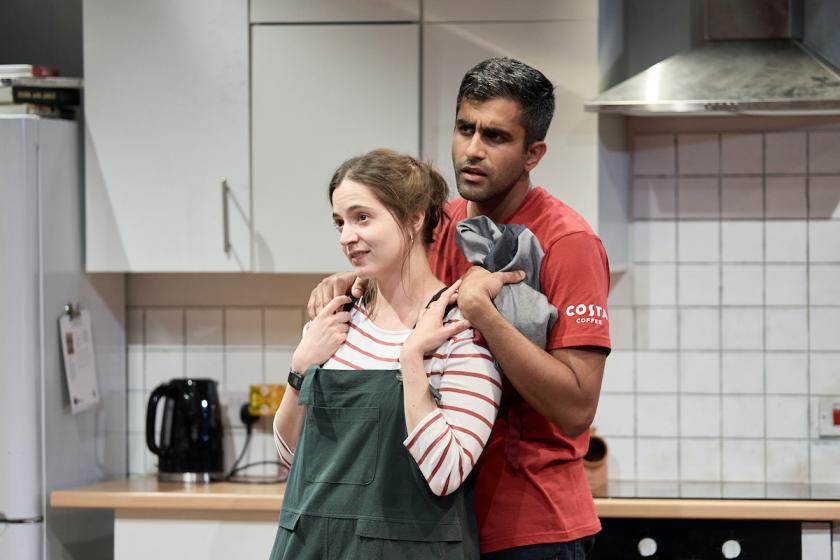“Welcome to motherhood, bitch!” By the time a character delivers this reality check, there have been plenty of laughs, and some much more awkward moments, in Richard Molloy’s The Harmony Test, which premieres in the Hampstead Theatre’s Downstairs studio space.
As directed by the venue’s Associate Director Alice Hamilton, this promises to be an evening of taboo- as well as rib-tickling comedy, and certainly something a bit more serious: the play’s title comes from the DNA-based blood screening test for the most common chromosomal abnormalities, including Down’s syndrome.
Set in the kitchen of recently hitched Zoe and Kash, the story begins with their attempts to start a family. As well as organising the best times and days to have sex, they also try other aids such as an odd semi-legal substance provided by a helpful health-food shop assistant – as well as trying out an intimate application of a bag of frozen peas. Things get much more complicated when teacher Zoe’s older colleague Naomi moves in with them, having left her insensitive hubbie Charlie and taken up with Rocco, a much younger hunk, sorry personal trainer, that she’s just met at the local gym.
 The strains of trying, maybe trying too hard, to start a family – and the gadgets we use, from apps to pregnancy tests – are immediately familiar. The audience laughs in recognition of the awkward conversations and slightly surreal atmosphere engendered by a couple trying to conceive. As well as at the bickering. Inevitably, when Zoe does become pregnant, other anxieties arrive: will her maternity leave salary be enough, does Kash, who is a struggling actor, have to get a “proper job”, and what if the Harmony Test brings unwelcome results?
The strains of trying, maybe trying too hard, to start a family – and the gadgets we use, from apps to pregnancy tests – are immediately familiar. The audience laughs in recognition of the awkward conversations and slightly surreal atmosphere engendered by a couple trying to conceive. As well as at the bickering. Inevitably, when Zoe does become pregnant, other anxieties arrive: will her maternity leave salary be enough, does Kash, who is a struggling actor, have to get a “proper job”, and what if the Harmony Test brings unwelcome results?
Molloy writes comedy very well, and his inclusion of serious issues is very effective. His portraits of his characters, each of whom is insecure (especially the men) is convincing and some of the punchlines land beautifully. The description of the shop assistant’s role in helping the couple, and Kash’s intensely nerdish appreciation of this magic remedy, is hilarious, as is Charlie’s wild and drunken speech about all the women he’s attracted to. There’s a really good balance between the cautious Zoe and the more adventurous Naomi, even though Rocco is slightly underwritten.
The central theme is the unharmonious strain that parenthood inevitably puts on most couples, and much of laughter in the scenes between Kash and Zoe is the amusement of instant recognition. Likewise, the collapse of Naomi and Charlie’s marriage, which is provoked by their daughter leaving home to go to university, is a reminder that an empty nest requires the parents to reassess their feelings for each other. Molloy refrains from judgement, and his sympathy for both couples gives the piece a well managed warmth.
But although The Harmony Test is very enjoyable to watch, it is not a perfect play. Molloy specifies that Kash is “a secular Muslim”, but although religion does feature at the start of the play it is then quietly dropped. The story’s aspect of ethnicity and belief could have been much more deeply developed. Similarly, in a few places, some of the funniest lines seem at odds with the characterization, and the play’s ending is both predictable and a bit overwrought. All of these faults are forgivable, but at the same time rather noticeable.
Still, Hamilton directs the 95-minute piece with great empathy, and gives the storytelling its necessary contrasts between loud and energetic scenes and more meditative moments, whose sadness is clearly articulated. Sarah Beaton’s realistic-looking set offers the pleasures once again of familiarity, and the excellent cast use the studio space effectively: Bally Gill’s Kash is likable and funny, and has a real rapport with Pearl Chanda’s Zoe, whose character develops subtly and beautifully throughout the show. Milo Twomey’s Charlie is full of bewilderment and pain, while Jemima Rooper gives Naomi armfuls of good sense and vigour (pictured above with Sandro Rosta, making his stage debut as Rocco). A good evening of laughter and empathy.















Add comment